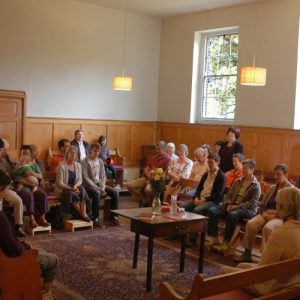We are delighted to share with you our library of resources. You can use the filter feature below to find topics most relevant to your curriculum.
Want to organise the resources you use most in one place? Register as a user to add content to your own Boards.
The Quakers
What does it mean to be a Quaker?
‘Quakers’ may seem a strange name but the origins of the name are interesting. In 1650 George Fox, the founder of the movement, was on trial in Derby for preaching his Christian beliefs. As the judge sentenced him to six months in prison, George Fox warned him to tremble in fear of God. The judge had heard that people sometimes shook with emotion at the meetings of George Fox, so he laughed and said, "You folk are the tremblers, you are the quakers."
From this came the nickname 'Quakers', but the real name is the Religious Society of Friends.
The Religious Society of Friends has its origins within Christianity and many Quakers consider themselves Christians but not all do; some regard themselves as members of a universal religion that simply contains Christian elements.
WHAT DO QUAKERS BELIEVE?
Quakers believe that God is everywhere, in every person, every place, and thing so they do not see the need for priests or special ceremonies. They believe God can be found in the middle of everyday life, as much as during a meeting for worship. On the whole, Quakers regard the Bible as a very great book but they don't see it as the only one, and rely on their own inner sense of morality as much as from any external source such as the Bible.
HOW IS THE CHURCH RUN?
Although there is no priest, Quakers do appoint groups of elders to whom they turn for advice. They also arrange study groups and discussions about spiritual matters. There is a Clerk who keeps the records and is usually an Elder.
Overseers are responsible for the pastoral care of Members and Attenders, looking after their practical concerns, such as visiting those in need, and arranging for them to have help when necessary, etc. The Quaker Meeting House is not a special building, just a useful one. Meetings can take place anywhere - often in people's houses - but having a large building can make it useful for all kinds of things. It can be shared with other groups in the local community as well.
Quaker services are a lot quieter than most churches. This is because Quakers believe if you want to hear something, the best way is to be still and not to have too many distractions around you.
Thoughts may then come into your mind which may help you. So when they meet they sit silently with their eyes closed in that bare room. They believe that through this, God can tell them how to live better lives. Quakers think of this time as God ‘leading’ them. If a person feels led to do so, they might stand up and tell the Meeting what they have learned or read passages from the Bible or other religious writings, which they think might help others.
Quakers do not take communion as part of the meeting, as other churches do. Instead, they remember Jesus' final act of love for his disciples, the Last Supper, in the old-fashioned 'Grace' - a few moments of silent worship at the beginning of each meal at home or with other Friends.
HOW DO CHILDREN BECOME A MEMBER?
They don’t have special ceremonies for christening new babies either. The baby is brought to Meeting to be 'introduced' and there is a sense of shared responsibility for helping them along in any way possible.
When children reach sixteen, they are asked whether they want to stay in the membership, and may continue to attend voluntarily.
You can watch a video about a Quaker service here.
Photo reproduced by kind permission of Wandsworth Quakers.
- human rights, based on their belief in equality of all human beings
- social justice
- peace
- freedom of conscience
- environmental issues - Quakers seek to live simply so as to reduce the burden on the world
- community life

